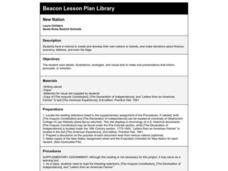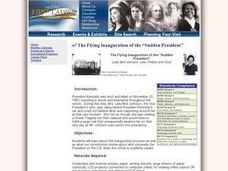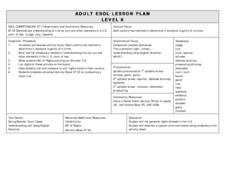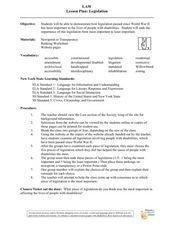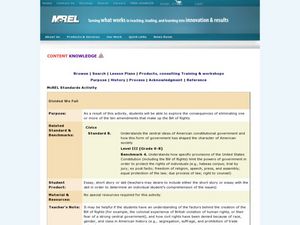Curated OER
Utah's Judicial Branch
Seventh graders explain that the judicial branch of Utah's government interprets laws and reviews the consitutionality of laws.
Curated OER
Tribal Sovereignty Mock Trial
Students discuss the issue of tribal/native nation sovereignty. They review the Constitution of the U.S. and discuss how it legally provides for sovereign nations. Then they participate in a mock trial of the 1823 Supreme Court Case...
Curated OER
New Nation
Fifth graders discuss leadership, citizenship, symbols for a nation, how to create peace after reading "The Iroquois Constitution," "The Declaration of Independence," and "Letters from An American Farmer." They create their own nations...
Curated OER
State of Oregon v. Dominguez-Martinez
Students are introduced to the concept of racial profiling. In groups, they analzye the case between Oregon and Dominguez-Martinez and evaluate the use of racial profiling as a tool of policemen. They also discuss the laws in place to...
Curated OER
History of Supreme Court
Learners study the role of the U.S. Supreme Court in U.S. history. They explore current events about the U.S. Constitution and discuss the Marbury v. Madison case from 1803. They identify the term "judicial review" and judicial...
Curated OER
US Patriot Act: Security vs. Privacy
Students use readings, worksheets and discussion to explore the ramifications of the US Patriot Act which was passed by Congress shortly after September 11th. They review Constitutional Amendments and consider how they relate to the...
Curated OER
The Judiciary in American History
Students investigate the influence of political and societal forces on judicial decisions. Among the topics they examine are the selection of judges and the cause and effect relationship between politics, society, and the law. to...
Curated OER
America Influenced by the Enlightenment
In this influence of the Enlightenment on America study guide worksheet, students read the notes provided and add notes of their own regarding the frameworks for the Declaration of Independence and U.S. Constitution.
Curated OER
VS.6a
Sixth graders explore, discuss and explain why George Washington is called the "Father of our Country" and James Madison is called the "Father of the Constitution." They view and create a graphic organizer after discussing a variety of...
Curated OER
Forming A Government
Students simulate being on an island after their ship has wrecked, or their plane has crashed. Food, fresh water, and shelter are in short supply. They must form a government, develop laws and penalties.
Curated OER
Lesson 2: How Taxes Evolve
Twelfth graders examine the legislative process of enacting federal income tax laws. They conduct research and report on the Federal Migratory Waterfowl Stamp (Duck Stamp) Act of 1934.
Curated OER
Is Bureaucracy Bad?
Students examine the term bureaucracy and its role in state government. They study the purpose of regulations and explain the role of regulatory agencies in South Carolina. They describe how administrators act as law makers and analyze...
Curated OER
ZIP: A One-Act Play
Students review amendments of the Constitution relating to due process. They discuss the Constitution in the case of Eberhard "Zip" Fuhr. They research the provisions of the WWII Alien Enemy Control Program. They determine how national...
National First Ladies' Library
The Flying Inauguration of the "Sudden President
Learners study the inauguration process as well as what the constitution states about who succeeds the President of the US when the office is emergently vacant. They discuss the role of government and the events leading to Lyndon...
Curated OER
Navigating The Legal System
Learners identify personal rights allowed under the law in the United States. An exploration of the legal process leads students to describe how the American legal system works. This lesson is intended for learners acquiring English.
Curated OER
Raids and Arrests of Enemy Aliens
Student read background summary information and debate how much control did the government require to keep the nation safe. They research how World War II restrictions on enemy lines were enforced and how it related to the U.S....
Curated OER
What's in the Water?
Students examine the Clean Water and Safe Drinking Water Acts. Using the text, they identify examples of how the federal and state governments implement public policy. They discuss how citizens can make sure that all levels of government...
Heritage Foundation
Congress's Economic Powers
Join Congress as they assess their economic abilities for spending—and as they discover their limits. High schoolers use an educational resource to explore Congress's economic powers and learn to apply these concepts to their everyday...
Curated OER
Due Process
Students understand the legal term "due process of law" and its historical origins. They discuss the requirements for "due process of law" in both the U. S. Constitution and the Indiana Constitution and how those rights are similar or...
Curated OER
World War II Alien Enemy Control Program
Learners review the history and language of the Alien Enemies Act and related laws as well as the Constitutional challenges it presents. They also review the World War II Alien Enemy Control Program and the Alien Enemy Hearing Board...
Curated OER
Legislation
Students rank the legislation of disabilities since World War I and write their rationale for the ranking. In this legislation of disabilities lesson plan, students do this for 5 legislations that have been passed.
Curated OER
Divided We Fall
Learners investigate the consequences of eliminating one or more of the amendments to the Bill of Rights.
Curated OER
Creating A Bill Of Rights In Space
Students create an Intergalactic Bill of Rights and apply the United States Bill of Rights to a hypothetical situation.
Curated OER
Judges In The Classroom
Pupils explore legal requirements of searches conducted with and without a warrant and explore legal standard for conducting random searches of passenger vehicles preparing to board state ferries from a Judge who visits the classroom.
Other popular searches
- Constitutional Law Games
- Discuss Constitutional Law
- Constitutional Law Privacy
- Constitutional Law Jeopardy
- Constitutional Law Lessons
- Constitutional Law Cruel
- Constitutional Law Syllabus




